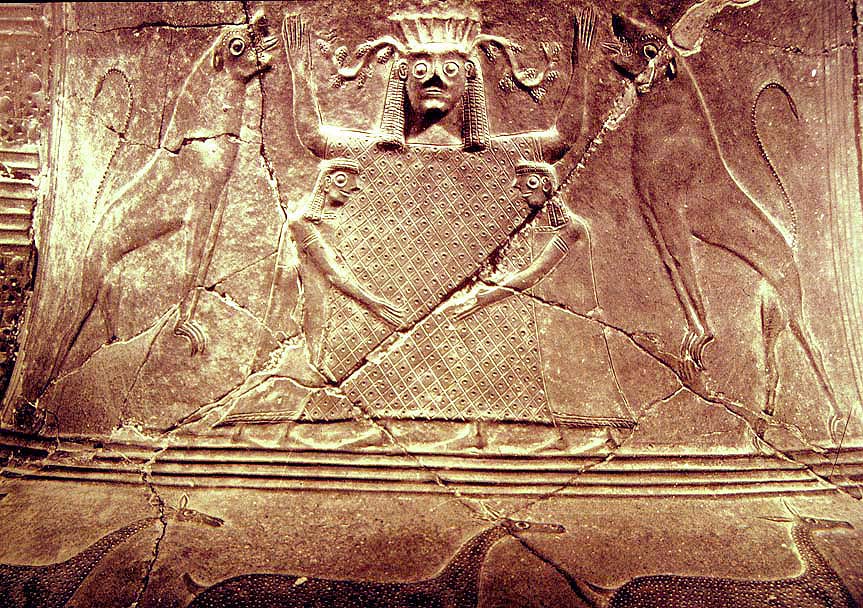by by Ron Leadbetter

Leto, being the mother of Artemis and Apollo, figured as the motive for the slaughter was Niobe's children was that Niobe had been bragging to Leto about bearing fourteen children (in some versions six or seven). Leto had only born two, and to make matters worse, Niobe then had the audacity to say, it must make her more significant than Leto. When the divine twins were told of this insult, they killed all Niobe's children with their deadly arrows. After which Niobe wept for her dead children so much that she turned into a pillar of stone. From one version of how Apollo slew the monster Python, it was said that while Leto was still pregnant with the divine twins, Python tried to molest her. As punishment, Apollo killed him and then took control of the oracle of Delphi.
Leto was worshiped throughout Greece, but principally in Lycia (Asia Minor). In Delos and Athens, there were
temples dedicated to her, although in most regions she was worshiped in conjunction with her children,
Artemis and Apollo. In Egypt there is the Temple of Leto (Wadjet) at Buto, which was described by
Herodotus as being connected to an island which floated. On this island (Khemmis) stood a temple to Apollo,
but Herodotus dismissed the claim that it floated as merely the legend of Delos brought to Egypt from Greek
tradition. The Romans called Leto "Latona".
"Copyright (c) 2000 Encyclopedia Mythica. All rights reserved."
as if to plead for me;" and the children, as it happened, were stretching out their arms. "'Who would not have been moved with these gentle words of the goddess? But these clowns persisted in their rudeness; they even added jeers and threats of violence if she did not leave the place. Nor was this all. They waded into the pond and stirred up the mud with their feet, so as to make the water unfit to drink. Latona was so angry that she ceased to mind her thirst. She no longer supplicated the clowns, but lifting her hands to heaven exclaimed, "May they never quit that pool, but pass their lives there!" And it came to pass accordingly. They now live in the water, sometimes totally submerged, then raising their heads above the surface or swimming upon it. Sometimes they come out upon the bank, but soon leap back again into the water. They still use their base voices in railing, and though they have the water all to themselves, are not ashamed to croak in the midst of it. Their voices are harsh, their throats bloated, their mouths have become stretched by constant railing, their necks have shrunk up and disappeared, and their heads are joined to their bodies. Their backs are green, their disproportioned bellies white, and in short they are now frogs, and dwell in the slimy pool.'" [see source: Ovid's Metamorphoses, Book VI, Agrestes Lycii (The Rustics of Lycia), lines 508 - 621]
This story explains the allusion in one of Milton's sonnets, "On the detraction which followed upon his writing certain treatises."
"I did but prompt the age to quit their clogs
By the known laws of ancient liberty,
When straight a barbarous noise environs me
Of owls and cuckoos, asses, apes and dogs.
As when those hinds that were transformed to frogs
Railed at Latona's twin-born progeny,
Which after held the sun and moon in fee."
The persecution which Latona experienced from Juno is alluded to in the story. The tradition was that the future mother of Apollo and Diana, flying from the wrath of Juno, besought all the islands of the AEgean to afford her a place of rest, but all feared too much the potent queen of heaven to assist her rival. Delos alone consented to become the birthplace of the future deities. Delos was then a floating island; but when Latona arrived there, Jupiter fastened it with adamantine chains to the bottom of the sea, that it might be a secure resting-place for his beloved. Byron alludes to Delos in his "Don Juan":
"The isles of Greece! the isles of Greece!
Where burning Sappho loved and sung,
Where grew the arts of war and peace,
Where Delos rose and Phoebus sprung!"
To read more go to Bulfinch's Mythology :
THE AGE OF FABLE OR STORIES OF GODS AND HEROES
by Thomas Bulfinch
copyrighted © 1996, 1997, 1998, 1999 by Bob Fisher.